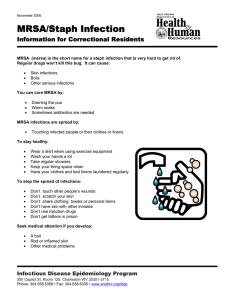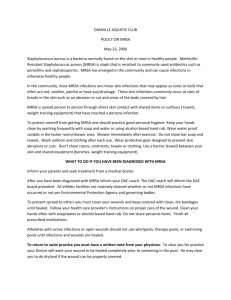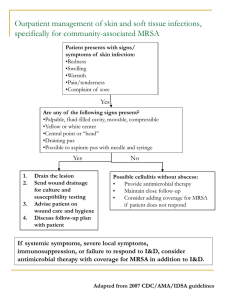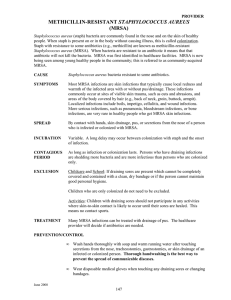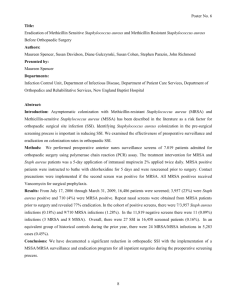Staphylococcus aureus MRSA What is methicillin resistant Can I get MRSA?
advertisement
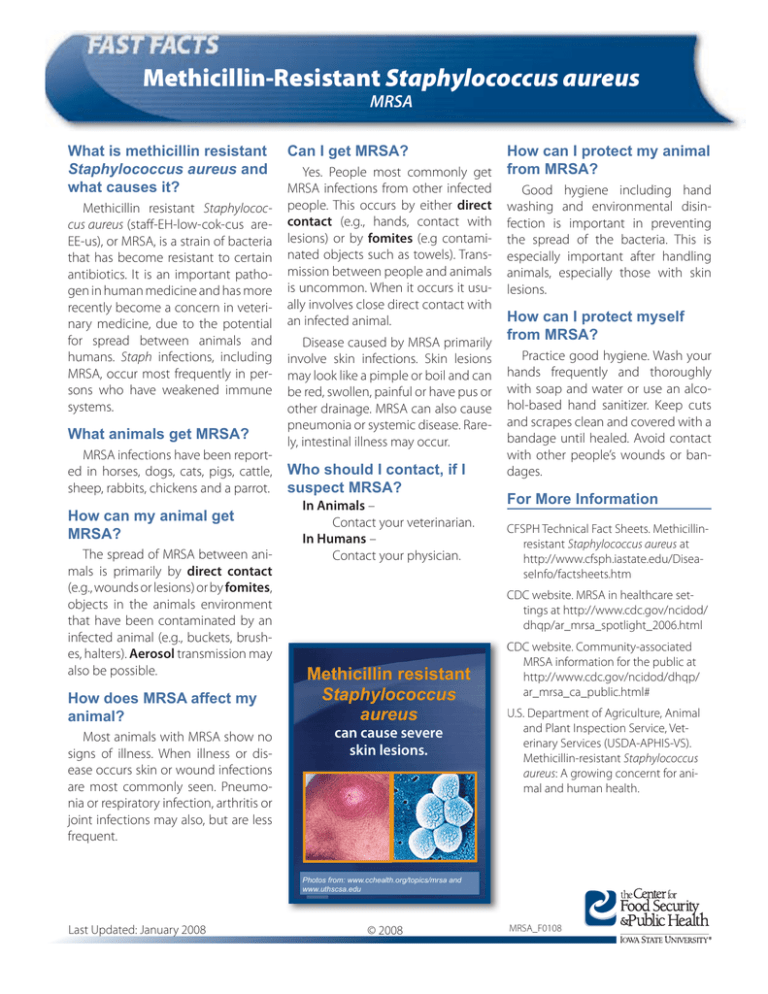
Methicillin-Resistant Staphylococcus aureus MRSA What is methicillin resistant Staphylococcus aureus and what causes it? Can I get MRSA? How can I protect my animal Yes. People most commonly get from MRSA? MRSA infections from other infected people. This occurs by either direct contact (e.g., hands, contact with lesions) or by fomites (e.g contaminated objects such as towels). Transmission between people and animals is uncommon. When it occurs it usually involves close direct contact with an infected animal. Good hygiene including hand washing and environmental disinfection is important in preventing the spread of the bacteria. This is especially important after handling animals, especially those with skin lesions. What animals get MRSA? involve skin infections. Skin lesions may look like a pimple or boil and can be red, swollen, painful or have pus or other drainage. MRSA can also cause pneumonia or systemic disease. Rarely, intestinal illness may occur. MRSA infections have been reported in horses, dogs, cats, pigs, cattle, sheep, rabbits, chickens and a parrot. Who should I contact, if I suspect MRSA? Practice good hygiene. Wash your hands frequently and thoroughly with soap and water or use an alcohol-based hand sanitizer. Keep cuts and scrapes clean and covered with a bandage until healed. Avoid contact with other people’s wounds or bandages. Methicillin resistant Staphylococcus aureus (staff-EH-low-cok-cus areEE-us), or MRSA, is a strain of bacteria that has become resistant to certain antibiotics. It is an important pathogen in human medicine and has more recently become a concern in veterinary medicine, due to the potential for spread between animals and humans. Staph infections, including MRSA, occur most frequently in persons who have weakened immune systems. How can my animal get MRSA? The spread of MRSA between animals is primarily by direct contact (e.g., wounds or lesions) or by fomites, objects in the animals environment that have been contaminated by an infected animal (e.g., buckets, brushes, halters). Aerosol transmission may also be possible. How does MRSA affect my animal? Most animals with MRSA show no signs of illness. When illness or disease occurs skin or wound infections are most commonly seen. Pneumonia or respiratory infection, arthritis or joint infections may also, but are less frequent. How can I protect myself from MRSA? Disease caused by MRSA primarily In Animals – Contact your veterinarian. In Humans – Contact your physician. For More Information CFSPH Technical Fact Sheets. Methicillinresistant Staphylococcus aureus at http://www.cfsph.iastate.edu/DiseaseInfo/factsheets.htm CDC website. MRSA in healthcare settings at http://www.cdc.gov/ncidod/ dhqp/ar_mrsa_spotlight_2006.html Methicillin resistant Staphylococcus aureus can cause severe skin lesions. C CDC website. Community-associated MRSA information for the public at http://www.cdc.gov/ncidod/dhqp/ ar_mrsa_ca_public.html# U.S. Department of Agriculture, Animal and Plant Inspection Service, Veterinary Services (USDA-APHIS-VS). Methicillin-resistant Staphylococcus aureus: A growing concernt for animal and human health. Photos from: www.cchealth.org/topics/mrsa and www.uthscsa.edu Last Updated: January 2008 © 2008 MRSA_F0108
